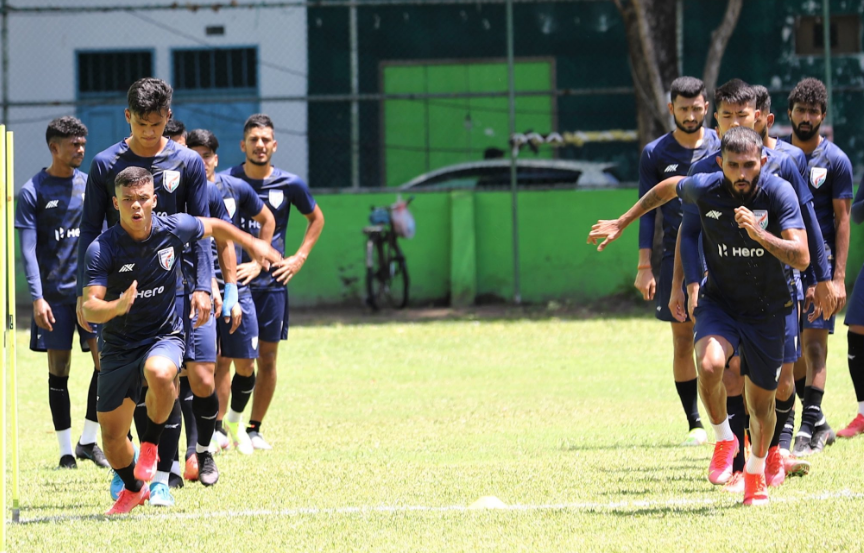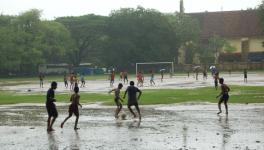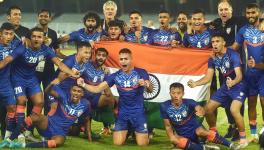Indian Football Team’s SAFF-est Bet for Trophy Begins. But What Purpose Does it Serve?

Indian football team players train in Male, Maldives, for the 2021 SAFF Championships. They open their campaign against Bangladesh on October 4 (Pic: @indianfootball, Twitter).
In 1997, India were runaway winners in the SAFF Championship. Starting with a smooth 3-0 win over Bangladesh, Carlton Chapman’s boys went from strength to strength to demolish Maldives 5-1 in the final.
While IM Vijayan’s six-goal blitz was the high point of the tournament, crafty Tushar Rakshit made all the difference with his defence-splitting passes and ability to control the midfield. He was the key figure in coach Syed Nayeemuddin’s scheme of things.
Yet, at the end of the meet, Rakshit found the triumph not much to celebrate about. “Winning the Federation Cup is tougher than this,” he told this correspondent curtly after the final on September 13.
Also Read | Tokyo Olympics Bronze Medalists Rupinder Pal Singh, Birendra Lakra Retire From International Hockey
Twenty-four years later, Rakshit, now a senior officer in a nationalized bank, laughs when reminded of it, but finds no reason to change his stand.
“What I said then was as a player having firsthand experience. Currently, I shouldn’t comment on other nations since I haven’t watched them. But I repeat, does it really make any difference whether India win the SAFF or not? Will it take Indian football to the next level?” asked Rakshit a couple of days before India begin their 2021 SAFF Championship campaign.
Rakshit is, arguably, the last midfield genius to come out from the once dazzling stable of Kolkata football. But he is certainly not the last person in Indian football to raise questions about the futility of SAFF, especially from an Indian angle. To say the tournament has gone far beyond its expiry date won’t be an exaggeration.
“It is a tournament played by teams having no impact on international football. I won it and many others like me in India will continue to win it in future. But it will not help us in achieving what we are aiming to, for all practical purposes. From my experience I know that I gained little,” said Rakshit, the former East Bengal star.
Not many will disagree with Rakshit. Going strictly by the FIFA ranking, the five-team championship that started in Male on October 1 is of abysmally low standard – India at 107 stand at the top. The other four are far below the ladder: Maldives (158) are followed by Nepal (168), Bangladesh (189) and Sri Lanka (205).
Pakistan and Bhutan are missing from the tournament for different reasons. Pakistan are serving a FIFA ban, while Bhutan are having Covid-19 related problems. But their presence wouldn’t have made any difference to India’s position in the meet.
Also Read | UEFA Forced to Drop Cases Against Rebel European Super League Clubs
The team which once looked like gaining in status to challenge India’s dominance was Afghanistan. They were the first to realize the ineffectuality of SAFF and pulled out of it in favour of the Central Asian Football Association (CAFA) in 2016. The move was to allow their national team to play against tougher opponents.
CAFA nations include Iran (22), Uzbekistan (84), Kyrgyz Republic (98), Tajikistan (118), Turkmenistan (130) and Afghanistan (153). Definitely a more competitive region compared to SAFF – the presence of Iran makes it look prestigious even.
If the news generated from within the All India Football Federation (AIFF) are to be believed, the CAFA executive committee are not averse to include India in their region, like it did for Afghanistan. Instead, AIFF said it was “not moving anywhere” from SAFF though it’s age group squads may play CAFA competitions from 2022 onwards.
Such camaraderie with other SAFF nations is definitely a sign of India’s commitment to the region. But at what cost? India have already won the SAFF championships seven times – given the current scenario, they will win it many more times. But will it help?
Are the reasons behind sticking with SAFF not entirely sporting? The hegemony in a particular region helps other purposes, especially when people nursing ambitions in world football’s organizational set-ups run the show. There is no scarcity of such people in football, not in India to say the least.
Also Read | India’s Poor Outing at Sudirman Cup Puts Question Mark on Depth of Badminton Programme
Whatever the reasons be, on October 4, Monday, when India take the field against Bangladesh in their round-robin opener, Igor Stimac and his men will feel the pressure. The pressure of being the favourites and being the highest ranked team in the tournament. Any slip up from Sunil Chhetri and his men will not be taken kindly by their fans. For India, playing the SAFF is like taking a penalty kick – one is expected not to falter and convert it each and every time.
All said and done, India are hot favourites for the title; a defeat for India would be the biggest setback. This is despite the fact India struggled against regional teams in the recent past.
Not being able to beat Afghanistan in two meetings in the 2022 World Cup qualifiers was a blot on Stimac’s coaching. Against Bangladesh, his boys were hardly impressive – they were disappointing in Kolkata and had to depend on Chhetri’s brilliance to win the next time.
The couple of friendly matches against Nepal last month were no better – the worst being the complaint against the weather and training pitches after Nepal relaxed some Covid-19 protocols to accommodate the Indians at home. It didn’t speak highly of the SAFF camaraderie.
Here the only issue that could be bothering India is the lack of match practice. They had attended a camp before going to Nepal, but had none before the SAFF. Having assembled in Bengaluru in the last week of September, the team left for Maldives almost immediately. One sincerely hopes the three-day training in Male before the first match would be enough for the Indian players. True, since SAFF is played outside the FIFA window, it is difficult for the federation to get the players for considerable time. Since the Indian domestic season is beginning next month (a one-tournament wonder), the clubs too need them for pre-season.
Also Read | Rich and Rusty: ATK Mohun Bagan’s Crushing Defeat at FC Nasaf Highlights Indian Football’s Dearth of Matches
India’s Croatian coach knows anything less than the title in SAFF would be a disaster for him. So, he has already been talking about artificial turf, injury management and the disadvantage of travelling by speed boats. But he was right when he said: “I have taken over two years ago. But I have not been able to spend much time with the players.” Stimac is a teacher, who has been asked to produce brilliant students without being given much teaching time.
Former captain IM Vijayan felt despite all hitches, India will win the SAFF 2021. “India have the best players. I don’t see any reason why they won’t win. In fact, I think India could have fielded the under-22 squad.”
Not a bad suggestion but it has practical difficulties. The other participating nations may consider it a big-brotherly snub that would not go down well in AFC organisational dynamics. Secondly, whether India are confident enough to repeat what they did successfully in 2010 under Sukhwinder Singh remains a big question. Stimac is already talking about missing Sandesh Jhingan, Rowllin Borges and Ashique Kuruniyan, leave alone playing with a junior squad.
After the World Cup qualifiers, Stimac said: “I was brought in to change the game from a defensive, counter-attacking style to a more progressive version of football that involves us improving our passing and having more control of the game. We have improved our passing accuracy and possession – we have become more technical.”
On the eve of the Bangladesh game, the Indian chief coach sounded far simpler. “We will be playing a style which will bring us results,” he said.
Pray, for a change, he proves right this time.
Get the latest reports & analysis with people's perspective on Protests, movements & deep analytical videos, discussions of the current affairs in your Telegram app. Subscribe to NewsClick's Telegram channel & get Real-Time updates on stories, as they get published on our website.
























